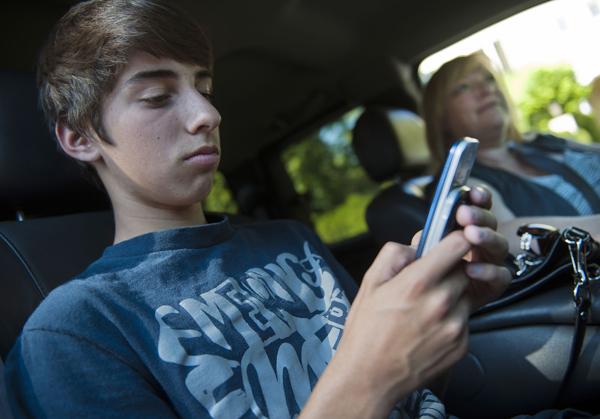Parents should hold off on cellphones for kids

MCT
Brandon Gonzales, 12, has been using a cell phone since he was 10. Almost all of his friends have cell phones, too. His mom, Elizabeth Gonzales, likes knowing that he can call home at any time. “It gives me peace of mind,” she said. Kids ages 9 to 12 are the fastest-growing cell phone market. (Renee C. Byer/Sacramento Bee/MCT)
April 11, 2012
Third grade was a time when I played with friends, learned cursive and began to take the slightest interest in girls. I certainly didn’t own a cell phone and wasn’t even aware of the World Wide Web.
A Bridgewater University study found of 20,766 third- through 12th-grade Massachusetts students, about 20 percent of third-grade boys and 18 percent of third-grade girls own cell phones.
That amazes me.
I realize when I was in third grade (1990, yes I’m old), technology wasn’t nearly as advanced as it is today. I know this sounds like one of those, “Back in my day…” moments, but for a third-grader to have a cell phone makes almost no sense to me.
I didn’t get a cell phone until I was a senior in high school – a Nokia 5110 (Google it) – which was also the time I got my first car. It was a little taboo at the time, as I remember trying to be conspicuous about having a phone. I’d hide it under my desk when checking it and made sure no one knew I had one – just my friends (what few I had).
Fast forward to today: people flaunt their phones and openly text, use Facebook and surf the Web freely in class. It’s a big change from 20-plus years ago.
But a third-grader – an 8- or 9-year-old – with a cell phone makes little sense.
There are always going to be those families who are well off and can afford to give their children phones, but there are a lot of responsibilities that come with phone ownership.
If these children have phones simply for making phone calls and possibly texting, that’s somewhat acceptable. It could help potentially save a child’s life if he or she is in a compromising situation or being stalked by a possible kidnapper.
It also opens them up to cyberbullying, which, the study found, increases with age while “traditional” bullying decreases.
An 8-year-old shouldn’t own a phone with access to the Internet or mobile-to-mobile picture messaging. That opens up a new avenue of potential debauchery.
But 18 to 20 percent of third-graders wielding cell phones seems almost irresponsible. It makes them a target of potential theft.
I was too busy playing baseball, hanging out with family and friends and just being a kid to worry about a cell phone. And despite not growing up in the best of neighborhoods, there’s no way I was ready for the responsibility of a phone – nor did I need one.
I can understand if there’s a latchkey kid who walks home from school everyday alone, but if there’s some rich kid flaunting the latest iPhone, that family needs to rethink its priorities.
The age at which I plan to give my children cell phones depends largely on decisions I’ll make with my wife-to-be, but I’m certain it won’t be before Junior or Missy is a teenager at the earliest – and it definitely won’t have any kind of data access or picture SMS messaging, a.k.a. NO SEXTING.
I’d rather have my future children have the ability to make real-life connections rather than being connected to an electronic device.
There’s a time when children need to grow up. Third grade is not that time. Such is the title of the 2010 documentary about Gustavo Dudamel, “Let the children play.”
Dustin Nosler can be reached at [email protected]
























































































































